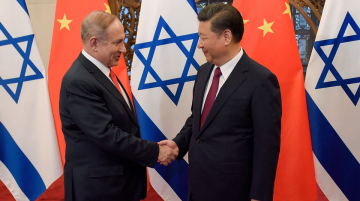
President Bashar al-Assad’s visit to China in late September is widely seen as an important step in Syria’s re-integration into the international community after years of Western-led international isolation.
Assad received a much warmer welcome in China than he would pretty much anywhere else in the world. He got the same treatment that any of visiting head of state receives in Beijing including an honor guard review on Tiananmen Square and a meeting with his Chinese counterpart Xi Jinping.
Beyond the recognition and the pageantry, though, Assad also came with a big wish list for Chinese assistance with reconstruction and requests for increased trade and investment.
Even though the two sides signed a number of MOUs and announced their formation of a “strategic partnership,” it’s still not clear if Assad got everything he wanted from the Chinese.
For some perspective, I spoke with Carmit Valensi, a senior researcher at the Institute for National Security Studies (INSS) in Tel Aviv.
Our conversation was lightly edited for clarity.
JONY ESSA: What do you make of Assad`s visit? What do you think his main goals were?
CARMIT VALENSI: In my opinion the aim of the visit was twofold: Diplomatic and Economic.
Economic-wise, al-Assad is looking for international partners to aid in the economic reconstruction of war-battered Syria seeking financial support to rebuild his country.
Diplomatically he is attempting to improve his international standing after being ostracized over atrocities committed during Syria’s ongoing civil war.
The recent normalization of relations with the Arab world and the rejoining of the Arab League have not so far benefitted any funding for reconstruction projects that are badly needed.
So, the aim is to try to gain as much as possible economically from China due to the lack of resources from other countries due to the American sanctions and the Ceaser Act (restrictions on funding and legislation that sanctions the Syrian government, including Syrian President Bashar al-Assad by the U.S., and United Nations).
JONY: What do you think the Chinese goals are from the visit?
CARMIT: Assad’s visit presents an opportunity for Beijing to demonstrate diplomatic strength at a time when China is facing an intensifying rivalry with the United States for geopolitical influence, including in the Middle East.
When the president of the Palestinian Authority, Mahmoud Abbas, visited Beijing in June, China offered to mediate between the Israelis and the Palestinians. Prime Minister Benjamin Netanyahu of Israel is expected to be presented with a similar offer of mediation when he visits China later this year.
The role of China as a mediator is intensified presenting a new world order presenting an alternative to the U.S. and Europe. Interacting with Syria whilst respecting its sovereignty and noninterfering domestic affairs as a precondition for aid offers an alternative to the traditional world order.
JONY: How do you think this visit might impact Syrian relations with other countries in the region?
CARMIT: The visit comes in the context of a larger normalization and mediation push in the region between Israel and Saudi Arabia that is sponsored by the United States. China might use its leverage as an established mediator after relaunching relations between Saudi Arabia and Iran last year to offer an alternative to the U.S. Chinese relations with Syria offer an additional channel of leverage while at the same time fostering ties and investment with Sunni Gulf states.
Carmit Valensi is a senior researcher at the Institute for National Security Studies in Jerusalem.






